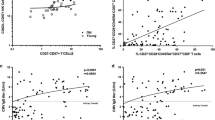Abstract.
In vitro functions of stimulated peripheral T cells and monocytes were investigated in patients experiencing sepsis following major visceral surgery. Cell culture supernatants were analyzed by ELISA for IL-2, IFN-γ, IL-4, IL-10, TNF-α, IL-1β, and IL-12 p40. In addition, monocyte HLA class II expression was determined by flow cytometry. T cell secretion of IL-2, TNF-α, and in part IFN-γ (but not IL-4) was significantly diminished in non-survivors throughout the entire course of sepsis, compared to controls and sepsis survivors. Production of IL-1β and IL-12 p40 by monocytes was strongly reduced in both survivors and non-survivors at the onset of sepsis. Persistence of depressed monocyte cytokine secretion correlated with lethality. Thus, overall suppression of cytokine production by T cells and monocytes was already observed at the beginning of postoperative sepsis. HLA class II expression by monocytes exhibited a strong and sustained down-regulation with no significant differences between sepsis survivors and non-survivors. In summary, suppression of both T cell and monocyte functions develops early during postoperative sepsis. Recovery of immune functions and severity of immune defects are associated with outcome.
Zusammenfassung.
Der Funktionszustand peripherer T-Lymphocyten und Monocyten wurde bei Patienten mit postoperativer Sepsis nach großen visceralchirurgischen Operationen anhand der Sekretion von Cytokinen sowie der Expression von HLA-Klasse-II Molekülen auf Monocyten untersucht. Hierzu wurden die Kulturüberstände stimulierter T-Lymphocyten und Monocyten mittels ELISA auf den Gehalt der Cytokine IL-2, IFNγ, IL-4, IL-10, TNFα, IL1β und IL-12 p40 analysiert. Die Antigen-präsentierende Funktion von Monocyten wurde anhand der HLA-DR und -DP Expression ermittelt. Die T-Zell-Sekretion von IL-2, TNF-α und partiell auch von IFNγ war bei Patienten mit letaler Sepsis gegenüber der Kontrollgruppe und Sepsisüberlebern signifikant erniedrigt, während die IL-4 Sekretion nicht alteriert war. Bei der Monocyten-Cytokinsynthese zeigte sich eine Suppression von IL-1β und IL-12 p40, deren Persistenz mit einem letalen Verlauf einherging. Die Suppression der Cytokinsekretion war bei T-Lymphocyten und Monocyten bereits zu Beginn der Sepsis vorhanden. Dies gilt auch für die HLA-Klasse II-Expression peripherer Monocyten. Die Ergebnisse zeigen, daß es in der postoperativen Sepsis zu einer initial einsetzenden Immunparalyse von T-Lymphocyten und Monocyten kommt. Die Erholung der Immunparameter und das Ausmaß der initialen Suppression sind mit dem Überleben der Patienten assoziiert.
Similar content being viewed by others
Author information
Authors and Affiliations
Rights and permissions
About this article
Cite this article
Heidecke, CD., Weighardt, H., Hensler, T. et al. Immunparalyse von T-Lymphocyten und Monocyten in der postoperativen abdominellen Sepsis . Chirurg 71, 159–165 (2000). https://doi.org/10.1007/s001040050028
Issue Date:
DOI: https://doi.org/10.1007/s001040050028




